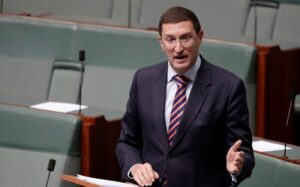The Australian
Olivia Caisley
Liberal MP Julian Leeser has secured the support of 17 Coalition colleagues for a private member’s bill that would make Australia’s telcos and their executives personally liable if a person dies during a natural disaster in circumstances where their phone signal failed.
The legislation that aims to overhaul the industry would also force telcos to publish details of complaints in their annual reports, introduce a “no service, no fee” clause if a customer’s signal drops out during business hours, and create a universal mobile service obligation.
Mr Leeser said there needed to be much greater mobile coverage across the nation.
“In a world where everyone is reliant on their mobile phone, Australians, regardless of where they live, should be able to use a mobile phone to make a call or access the internet inside their home or their workplace,” he said.
“Nobody should have to go into their backyard, go to the end of their driveway or drive to the top of a hill for their phone to work.”
Mr Leeser said the bill would change the definition of coverage so that a telco could only claim to cover an area if the mobile services supplied can be used in the majority of “above-ground living areas”, adding: “It isn’t good enough for a telco to cover the end of the driveway or the far side of a paddock.”
After roads, bridges and telecommunication towers were severely damaged in the Black Summer firestorms, leaving those who were trying to evacuate stranded and out of contact, the bill specifically forces telcos to “be more responsible in the provision and maintenance of service to disaster prone areas”.
It mandates battery back-up times on phone towers and requires telcos to not turn off existing 3G coverage in an area until alternative 4G or 5G is available.
If a coroner finds that a natural disaster death could have been prevented if a telco acted differently, the company and its executives would be slapped with financial penalties.
Nationals MP Anne Webster said connectivity had become central to the daily lives of Australians and key to running a successful business, helping kids learn and connecting loved ones across vast distances.
“Connectivity is not equal in our country. Regional and rural areas, including in my electorate of Mallee, experience worse connectivity, leading to poorer outcomes for communities,” she said.
This proposed legislation would also apply a version of the banking executive accountability regime to telcos, making executives personally accountable for poor customer service and failure to meet the needs of customers. Their bonuses would also be contingent on customer service.
Liberal MP John Alexander said reliable communication was more important than ever in the Covid era. “I receive numerous contacts from locals informing me of internet and phone outage problems they experience,” he said. “This is quite frustrating for me, but incredibly so for those affected, which is understandable.”
Another of the bill’s backers, Queensland MP Julian Simmonds, said many of those living in Brisbane’s western suburbs had to put up with slow internet and mobile black spots.
“I am proud to support the bill as it guarantees a higher standard of customer service from telcos to ensure every Australian, no matter where they live, can have a reasonable internet and mobile phone connection,” he said.




